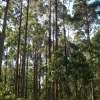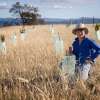
General Biosecurity Duty introduced
Posted 02 March 2021
Managing trees On-farm benefits Economic benefits and markets
Following extensive industry and community consultation, the Biosecurity Act 2019 (the Act) introduces a new legal obligation in Tasmania known as the General Biosecurity Duty, or GBD. The General Biosecurity Duty came into effect on 31 March 2021.
The Act emphasises the importance of shared responsibilities and the need for government, industry and the community to work together to maintain a strong biosecurity system.
The GBD will operate as a statutory “duty of care” for everyone (government, industry and the community) in respect to biosecurity.
This will mean that all Tasmanians will have a duty to take all reasonable and practicable measures to prevent, eliminate, or minimise biosecurity risks when dealing with any biological matter or carrier, if they ought to know that there may be a biosecurity risk. The GBD also applies to visitors to Tasmania and to individuals and businesses who import biological material or equipment into Tasmania.
This does not mean that you need to be a biosecurity expert, however you do need to know about the biosecurity risks that apply to your specific industry, business, work environment or pastimes - and how to manage and minimise those risks to the best of your ability. For many biosecurity stakeholders, the introduction of the GBD will not change the way they go about their daily business or recreational activities.
The GBD reinforces that everyone has a role to play in protecting our unique environment and primary industries against biosecurity risks.
Understanding and meeting your GBD responsibilities will help protect your business, our primary industries, the environment and our way of life here in Tasmania.
Biosecurity Tasmania has developed a range of helpful resources to assist you to understand the GBD, to identify your GBD responsibilities to help keep Tasmania biosecurity safe.
You can find more information on the website: www.dpipwe.tas.gov.au/GBD
We all have a General Biosecurity Duty to help protect Tasmania from pests, weeds and diseases.
Share this Article
Latest Articles
-

17 September 2025
Celebrating excellence at the Tasmanian Timber Awards
-

17 September 2025
Forest Practices Authority Research Update Day
-

13 August 2025
Have you seen our Stems for CO2 Project signage on the Midlands Highway?
Archives
- ActivAcre hits milestone, calls for more farmers to get on board
- Napier's leading the way in sustainable forestry and carbon-neutral farming
- Sound science needed to assess carbon impacts of timber harvesting
- Newly appointed TFFPN Board of Directors
- Graduate Certificate of Forestry Scholarship
- Forestry Australia Mentoring Program 2025
- Forest Industry Roundtable planning for the long term
- Eagle Management Constraint Period extended
- Successful private native forest management celebrated
- $15 million investment in new ship loader to boost Bell Bay's forestry exports
- Standing with Tasmania's forestry industry: buy local
- TFPA: Tasmanian Freight Equalisation Scheme needs a ground-up review
- AFCA Gala Dinner celebrates industry excellence
- Fire permits now required Statewide
- Forest leaders hone skills in sustainable native regrowth management
- Tasmanian forests and the carbon market: Barriers and opportunities
- Spring is the time for fuel reduction burning
- Primed for Growth: A situation analysis of the Tasmanian Forest and Wood Products Sector
- Audit requirements cut for low-risk plantation projects
- Guidance and support for landowners after damaging winds
- Forestry Australia welcomes further definition of active forest management
- Farm & Forest Mapper Tool highlighted at Rural Youth Tasmania's Young Farmer of the Year competition
- Senate Select Committee inquiry into the Tasmanian Freight Equalisation Scheme
- Timberlink announces new wood composite products brand
- Newly developed protocol a vital tool for safeguarding forestry industry
- Red Hot Tips: Fire management for Tassie farmers
- Bioenergy: Fuelling industries with trees
- Harvesting trees: What you need to know
- Shelterbelts: How are they contributing to farm systems?
- Infill plantings and remnant vegetation: Why biodiversity depends on a thriving understory
- Plantation planning: The key to a successful plantation
- Exciting interactive forestry knowledge hub launched
- $450,000 farm forestry grant recipients revealed



